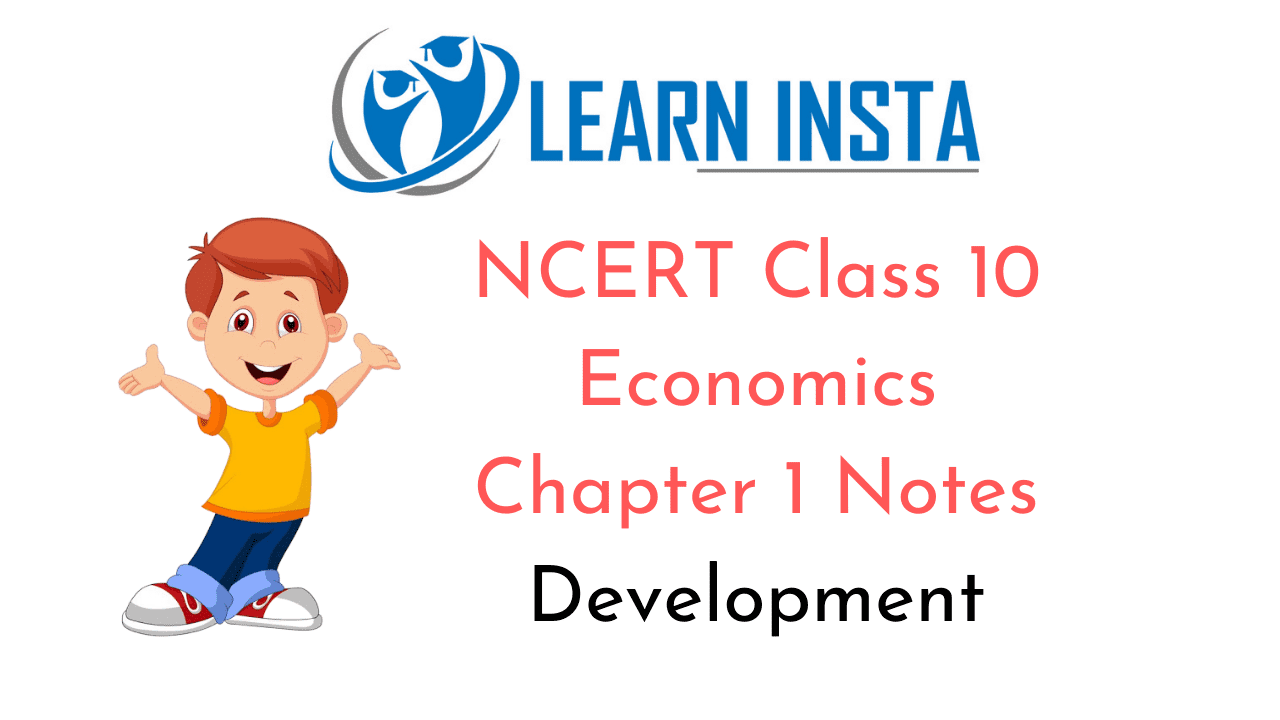 On this page, you will find NCERT Class 10 Economics Chapter 1 Notes Pdf free download. CBSE Class 10 Social Science Notes Economics Chapter 1 SST Development will seemingly, help them to revise the important concepts in less time.
On this page, you will find NCERT Class 10 Economics Chapter 1 Notes Pdf free download. CBSE Class 10 Social Science Notes Economics Chapter 1 SST Development will seemingly, help them to revise the important concepts in less time.
Development Class 10 Notes Social Science Economics Chapter 1
CBSE Class 10 Economics Chapter 1 Notes Understanding the Lesson
1. Development has many aspects. People have different perspectives on development and there are ways by which we can arrive at common indicators for development.
2. Different persons have different notions of development. They seek different things. They seek things that are most important for them. What may be development for one may not be development for the other.
3. One common thing about developmental goals of different persons is more income. Besides seeking more income, one or the other, people also seek equal treatment, freedom, security and respect of others. They never like discrimination. All these are important goals.
4. Our life depends on money or material things as well as non-material things. If we need money, we also need freedom and security in the same intensity. So, for development, people look at a mix of goals. Along with better wages, they also wish for other important things in life.
5. Different persons could have different as well as conflicting notions of a country’s development. National development means thinking about questions like – Can all the ideas of national development be considered equally important? Or, if there are conflicts how does one decide? etc.
6. All countries are not equally developed. Some are developed while others are underdeveloped. For comparing countries, their income is considered to be one of the most important attributes.
7. Countries with higher income are more developed than others with less income. This is based on the understanding that more income means more of all things that human beings need.
8. Countries with per capita income of US $ 12616 per annum and above in 2012, are called rich countries and those with per capita income of US $ 1035 or less are called low-income countries.
9. India comes in the category of low middle income countries because its per capita income in 2012 was just US $ 1530 per annum.
10. Besides average income, other equally important attributes to the development of a country or a region are – gross national income, life expectancy at birth, literacy rate and HDI (Human Development Index) rank in the world.
11. The per capita income of Maharashtra is higher than Bihar. It means Maharashtra is more developed than Bihar. In terms of Infant Mortality Rate, Kerala shows nice record but Maharashtra does not. In Kerala, out of 1000 children born, 12 died before completing one year of age but in Maharashtra the proportion of children dying within one year of birth is 25. But the per capita income of this state is more than that of Kerala.
12. Income by itself is not a completely adequate indicator of material goods and services that citizens are able to use. For example, money cannot buy one a pollution-free environment.
13. Important things like unadulterated medicines, protection from infectious diseases, etc. should be provided collectively because it would be the cheapest way also.
14. Sri Lanka, a small country, is much ahead of India, in respect of GNI (Gross National Income), life expectancy at birth, literacy rates, etc. Nepal has less than half the per capita income of India, yet j it is not far behind India in life expectancy and literacy levels.
15. It is people, their health, their well-being, that is most important in measuring human development.
16. We should also think of sustainable development. It is not wise to overuse our natural resources. It can pose problems before us as well as our future generations.
Development Class 10 CBSE Notes Important Terms
Development: A comprehensive term that includes increase in per capita income, reduction of poverty, increase in literacy rate, etc.
Economic development: A term that refers to all round development of a country. A country has a developed economy if its people earn higher income and able to satisfy most of their desires.
Per capita income: Total income of a country divided by its total population. It is also called average income.
Human development: Development of an individual as per his/her mental and physical abilities.
National income: The total value of all the goods and services produced within a country plus the net income from abroad during a year.
Developed country: A country that possesses the characteristics of higher standard of living of the people, fuller utilization of resources and a modern technology.
Renewable resources: Resources that are replenished by nature.
Non-renewable resources: Resources that are not replenished by nature and get exhausted after years of use.
Sustainability: The regular process without harming the productivity of future generations and satisfy the need of present generation.